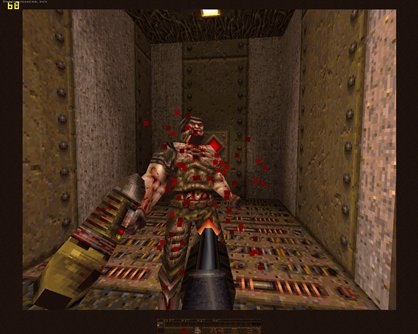Will Wright's Top 8
Famed designer curates video game section at Vancouver Art Gallery's KRAZY! exhibit. Here's what he chose and why
Civilization was particularly well known for sucking you in for hours on end and offered no real "correct" path or ending. Instead, it was designed in such a way that the player became a designer of sorts too. With the freedom to experiment, manage, build, destroy, or upgrade various aspects of your Civ at will, there was always something to look forward to if you played a little longer.

Wright links Civilization’s origins to board games and cites it as an important link to role-based war games. “Like all board games Civilization is an abstraction of reality… [it] takes a very complex, messy world and reduces it to a more symbolic representation, cutting it up into discrete pieces so that the environment seems clearer,” says Wright about the landmark PC game.

QUAKE dominated the computer and video games section at the KRAZY! exhibit in terms of sheer space, taking up two entire walls. One wall featured a collection of framed cut outs of the game’s monsters, items and weapons. Another featured a giant collection of monitors looping video clips of gameplay from the classic first-person shooter.
“I’ve never had a more immersive gaming experience than playing QUAKE in a dark room, sitting with my face right up to the monitor,” confesses Wright. But even though Wright gives designer John Carmack credit for his subtle manipulation of lighting, graphics and sound, that give the game its frightening feel, it seems that Wright also chose QUAKE for the modding community that evolved after the game was released.

Above: QUAKE was a great shooter. But its enthusiastic modding community was especially influential to Wright
“First it was just simple data-driven things, like level design or weapons, but then people started putting in tools to record game sessions. And so, for the very first time, people started using a game to make little movies. They could customize the characters and levels, and then tell a story, record it and share it with others. And this one little snippet of the QUAKE community went off and grew into the thing we now call “machinima” – using game engines to create short movies,” explains Wright.

As mentioned earlier, Will Wright was reluctant to include The Sims and Spore in his section of the exhibit. Since each curator was asked to limit the number of selections for their section to only seven or eight works, it’s possible that Wright may have felt that including two of his own games would not allow him to cover other important contributions. Whatever the case, we were glad to gain further insight on Wright’s retrospective thoughts on one of his biggest successes.
Weekly digests, tales from the communities you love, and more
Considering Wright’s reasoning for including QUAKE - instead of other early influential shooters like Doom or Wolfenstein 3D – it’s interesting to learn that QUAKE’s modding community had a strong influence on Wright while he was working on the player driven design of The Sims.

Above: Amazing things happen when games like The Sims don’t “invalidate the player’s narrative”
“The Sims is clearly focused on the player’s story. That’s the point of the game and it’s interesting socially because of the huge communities that have formed around it. Because the game is thematically neutral, the community has filled it with custom content, resulting in a huge amount of shared storytelling. The game goes out of its way not to invalidate the player narrative, which allows the players full ownership of the emergent story,” explains Wright.
We deeply appreciate the way that The Sims doesn’t “invalidate the player narrative.” If it did, we wouldn’t be able to feature the sequel in our list of theTop 7 girl-on-girl kisses.



